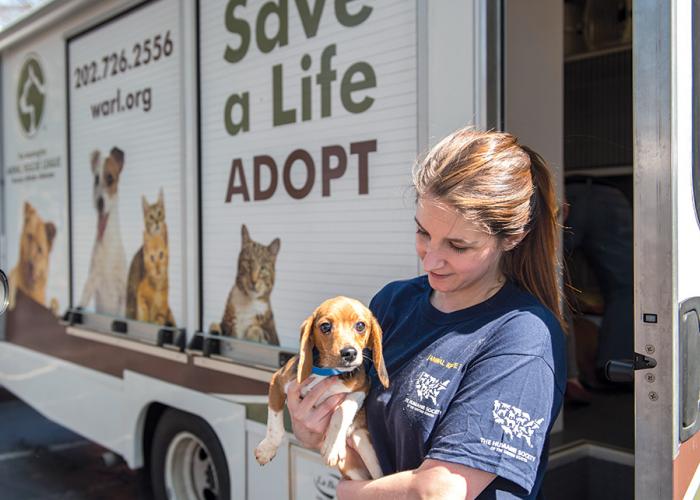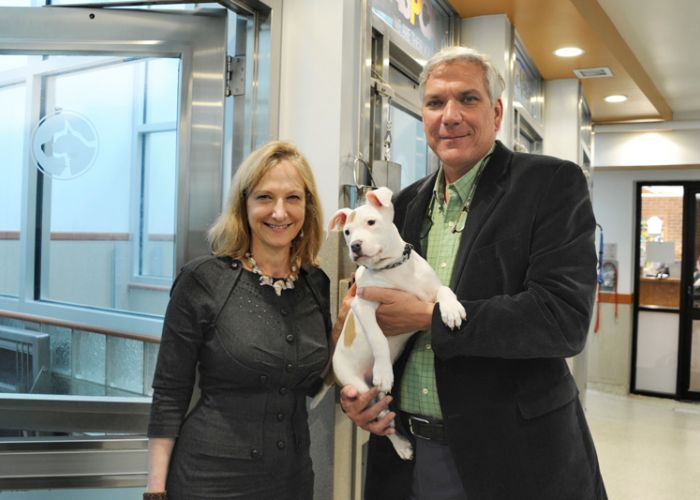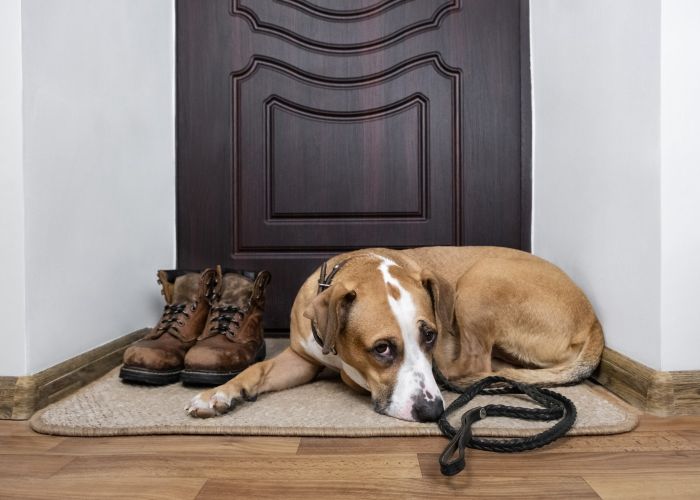A tech solution to crisis foster care for pets
BestyBnB helps animal shelters, social service agencies find temporary housing for pets of families in crisis

Software developers (and old college buddies) Matt Krentz and Andy Bond credit the inspiration for their latest venture to a radio show.
In May 2019, Krentz was listening to his local NPR affiliate when the reporter began an interview with Safehome, a domestic violence shelter in Johnson County, Kansas. Krentz quickly called Bond and told him to tune in.
One detail in particular caught their attention. Over half the time someone called the Safehome hotline and learned they couldn’t bring their pet, they would hang up the phone and remain in a potentially life-threatening and violent situation. “That really just stopped us in our tracks,” Bond says.
The two thought they could use their technical expertise to facilitate temporary housing for the pets of people in crisis situations. They contacted Safehome to pitch their idea and take a tour.
Did you know?
71% of individuals in domestic violence shelters report their abuser threatened, injured or killed a pet.
—National Coalition Against Domestic Violence
A glance into the children’s play area at the shelter cemented their decision. “At that point, we’d done enough research to know that likely 70% of the kids in that room were removed from a pet [who] would have been one of their sole sources of comfort and companionship in those abusive situations,” says Bond.
Over the next year, Krentz and Bond visited human services agencies and animal shelters across the country. They quickly discovered that the lack of safe, temporary pet housing wasn’t just a barrier for people experiencing domestic violence. Agencies focused on housing insecurity, mental health, substance use disorders, veterans’ support or other needs all shared stories of people who would delay or refuse help because they had nowhere for their pets to go.
After first launching with seven domestic violence agencies in Kansas City, BestyBnB made its national debut as both a website and an app at Animal Care Expo in spring 2023.
“That was really kind of our coming out party … to say, ‘Hey, this is what we built, this is how it can work in one community, now you can go tailor that to fit your community,’” Bond says.

How it works
Often described as a confidential Airbnb for pets, BestyBnB is a “for-profit impact venture with a social justice mission,” Krentz says.
The platform was designed to enable animal shelters and human social service agencies to launch or expand crisis housing programs for pets whose owners are in challenging situations. There are tools to help organizations manage their pet foster programs, as well as marketing materials to recruit pet caregivers in the community.
Caregivers, who typically donate their services or charge reduced fees, create a free account on BestyBnB, view training videos and undergo a background check before being approved to be foster pet parents. Staff at partnering organizations can peruse the profiles of available pet caregivers in their community to find the best fit for clients’ pets who need temporary care, whether it’s a dog, cat, horse, bird, rabbit or, in the case of the very first animals helped, six turtles.
Pet owners and foster parents can communicate directly with one another through the platform while maintaining confidentiality. Foster parents can ask questions about a pet’s care, likes and dislikes, and they can share videos, photos and updates with the owner. The ability to communicate directly with the caregiver brings peace of mind to the pets’ owners, says Bond, quoting one example of an owner who said the best part of their hospital stay was being able to look at pictures of their pet.

This feature also makes it easier for staff at partnering animal shelters and social service agencies, who don’t have to play messenger. Otherwise, the time it takes to be the middle person between foster parents and owners can limit how many animals an organization can help, says Lindsay Hamrick, director of shelter outreach and engagement for the Humane Society of the United States.
For the safety of the pets and people involved, only the staff members who administer the BestyBnB account for the partnering organization have access to pet owner and caregiver data, and neither the owner nor the caregiver knows each other’s identity or location.
That anonymity serves another purpose, says Zoë Agnew-Svoboda, BestyBnB’s director of engagement and program development. Foster families can sometimes jump to conclusions about a person’s ability to care for their pet. They may bond with the animal and be reluctant to send them back to what they perceive to be uncertain circumstances.
“We know that when someone is facing crisis, they’re not always doing the best they can in that moment,” says Agnew-Svoboda. This doesn’t necessarily reflect the care they’ll be able to provide their pets after they get through the challenging situation, she adds.
For human service agencies that haven’t been able to address the pet side of crisis housing, BestyBnB makes it easy for them to offer this service to their clients, says Hamrick. “The animal shelter doesn’t have to do it all. In communities where social service agencies are the lead on finding foster homes, the shelter can simply provide supplies and vaccinations and be assured that the owner is receiving services.”
To date, 36 animal shelters and human social service agencies in 13 states have established BestyBnB accounts. Over six months in the Kansas City metropolitan area alone, BestyBnB partners provided more than 4,000 “safe nights” with a 100% reunification rate for 175 pets and their families, Krentz says.
“It’s been a really fulfilling and inspiring part of our lives,” says Bond. “The impact that we’ve seen has been really, really humbling.”






